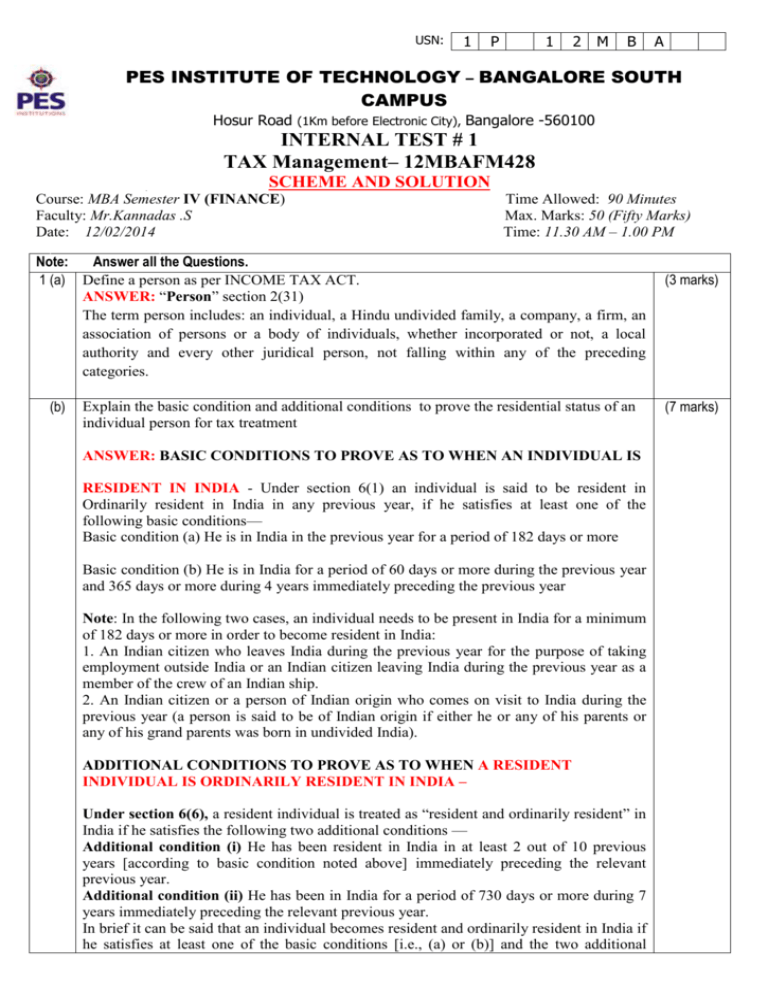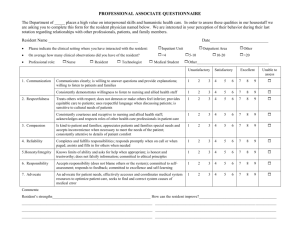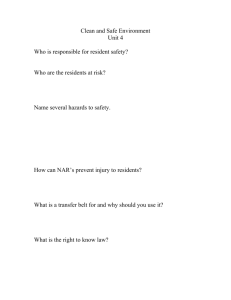TM_T1_Key
advertisement

USN: 1 P 1 2 M B A PES INSTITUTE OF TECHNOLOGY – BANGALORE SOUTH CAMPUS Hosur Road (1Km before Electronic City), Bangalore -560100 INTERNAL TEST # 1 TAX Management– 12MBAFM428 SCHEME AND SOLUTION Course: MBA Semester IV (FINANCE) Faculty: Mr.Kannadas .S Date: 12/02/2014 Time Allowed: 90 Minutes Max. Marks: 50 (Fifty Marks) Time: 11.30 AM – 1.00 PM Note: Answer all the Questions. 1 (a) Define a person as per INCOME TAX ACT. ANSWER: “Person” section 2(31) The term person includes: an individual, a Hindu undivided family, a company, a firm, an association of persons or a body of individuals, whether incorporated or not, a local authority and every other juridical person, not falling within any of the preceding categories. (b) Explain the basic condition and additional conditions to prove the residential status of an individual person for tax treatment ANSWER: BASIC CONDITIONS TO PROVE AS TO WHEN AN INDIVIDUAL IS RESIDENT IN INDIA - Under section 6(1) an individual is said to be resident in Ordinarily resident in India in any previous year, if he satisfies at least one of the following basic conditions— Basic condition (a) He is in India in the previous year for a period of 182 days or more Basic condition (b) He is in India for a period of 60 days or more during the previous year and 365 days or more during 4 years immediately preceding the previous year Note: In the following two cases, an individual needs to be present in India for a minimum of 182 days or more in order to become resident in India: 1. An Indian citizen who leaves India during the previous year for the purpose of taking employment outside India or an Indian citizen leaving India during the previous year as a member of the crew of an Indian ship. 2. An Indian citizen or a person of Indian origin who comes on visit to India during the previous year (a person is said to be of Indian origin if either he or any of his parents or any of his grand parents was born in undivided India). ADDITIONAL CONDITIONS TO PROVE AS TO WHEN A RESIDENT INDIVIDUAL IS ORDINARILY RESIDENT IN INDIA – Under section 6(6), a resident individual is treated as “resident and ordinarily resident” in India if he satisfies the following two additional conditions — Additional condition (i) He has been resident in India in at least 2 out of 10 previous years [according to basic condition noted above] immediately preceding the relevant previous year. Additional condition (ii) He has been in India for a period of 730 days or more during 7 years immediately preceding the relevant previous year. In brief it can be said that an individual becomes resident and ordinarily resident in India if he satisfies at least one of the basic conditions [i.e., (a) or (b)] and the two additional (3 marks) (7 marks) conditions [i.e., (i) and (ii)]. It will be worthwhile to note the following propositions: 1. It is not essential that the stay should be at the same place. It is equally not necessary that the stay should be continuous. Similarly, the place of stay or the purpose of stay is not material. 2. Where a person is in India only for a part of a day, the calculation of physical presence in India in respect of such broken period should be made on an hourly basis. A total of 24 hours of stay spread over a number of days is to be counted as being equivalent to the stay of one day. If, however, data is not available to calculate the period of stay of an individual in India in terms of hours, then the day on which he enters India as well as the day on which he leaves India shall be taken into account as stay of the individual in India. RESIDENT BUT NOT ORDINARILY RESIDENT As per section 6(1), an individual who satisfies at least one of the basic conditions but does not satisfy the two additional conditions is treated as a resident but not ordinarily resident in India. In other words, an Individual becomes resident but not ordinarily resident in India in any of the following circumstances: Case 1 If he satisfies at least one of the basic conditions but none of the additional conditions Case 2 If he satisfies at least one of the basic conditions and one of the two additional conditions NON-RESIDENT An individual is a non-resident in India if he satisfies none of the basic conditions. In the case of non-resident, additional conditions are not relevant. (c) (10 marks) ANSWER: Computation of taxable income from salary of Mr.Ramlal for the AssessmentYear 2014-15 Particulars 1. Basic salary 2. Entertainment allowance (As he is not a central or state government employee, its fully taxable) 3. Dearness allowance 4. Perquisites I. Gardener, sweeper, watchmen and a Amt in Rs. 14000x12 500x12 Amt in Rs. 168000 6000 3000x12 36000 (150+200+1100+600)x12 24600 2 (a) domestic servant. II. Repair charges of Free used refrigerator III. Gas electricity and water bill IV. Annual membership fee to lions club (2400+900)x12 V. Expenses on use of large car VI. Sons fee education facility in the Upto school run by the employer 12000(1000x12)exempted VII. Sweat equity shares (300x250)-(300x100) VIII. Leave vacation stay in simla guest house (company’s guest house) Total taxable income from salary Total Define salary as per INCOME TAX ACT. ANSWER: Under section 17 of the Income Tax Act, 1961 there are following which comes under head of salary: 400 15000 1000 39600 Nil 45000 5000 340600 (3 marks) incomes Salary (including advance salary) Wages Fees Commissions Pensions Annuity Perquisite Gratuity Annual Bonus Income From Provident Fund Leave Encashment Allowance Awards (b) (7 marks) ANSWER: Computation of taxable HRA of Mr.Pratap Chowdari Particulars Amt in Rs. Amt in Rs. Actual HRA received 24000 Least of the following is deducted from the actual HRA 1. Actual HRA received 24000 2. 40% of the salary (basic+DA+Fixed % of commission) 86888 40% of (192000+19200+7% of 86000) 3. Excess rent paid over 10% of salary 4. 21500-10% of (192000+19200+7% of 86000)21722=(222) Nil Nil TAXABLE HRA 24000 (c) Dr. VatsanThomas, a medical practitioner provides you the Income & Expenditure account for the year ended 31st March 2014 (4+6=10 marks) Following additional information has been provided: (a) Visit fees include ` 10,000/‐ received as a gift from father. (b) Entire stock of medicines has been utilised. (c) Half of the rent is attributable towards residence. (d) ` 2,300 printing charges are incurred for printing wedding cards of his daughter. Compute on the basis of the above information Dr. Vatsan thomas’s taxable income from profession for assessment year 2014‐2015 ANSWER: Computation of taxable income from profession of Mr.Vatsan Thomas for the AY 2014-15 PARTICULARS Amt in Rs. A) Admissible income from profession 1. Consultation fees 260000 2. Visiting fees (30000-10000) 20000 3. Sale of medicine 30000 A 310000 B) Admissible professional expenses 1. Salary to staff 2. Rent (36000x1/2) 3. Purchase of medicine 4. Telephone expenses 5. Printing and stationery (11500-2300) 6. Books and periodicals Taxable professional income 3 B A-B 54000 18000 28000 12000 9200 11800 133000 177000 Case Study - (Compulsory) Mr. subramanyam sells the following longterm capital assets on January 11, 2014. Particulars commercial Gold Non-listed Diamonds Property shares Sales consideration (in Rs) 1400000 800000 1780000 1560000 Year of acquisition 82-83 83-84 92-93 91-92 CII 109 116 223 199 Cost of acquisition (in Rs) 99964 36684 267268 100881 Mr.Subramanyam owns one residential house property on april 3 2014, he invests in the following assets, 1. Residential house property Rs.4300007 2. NHAI bonds Rs.740000 (redeemable after 7 years) 3.REC bonds Rs.1560000 (redeemable after 4 years) ANSWER: Compute the exemptions and the chargeable capital gain for the assessment year 2014-15 Particulars commercial Gold Non-listed Diamonds Property shares (10 marks) Sales consideration (in Rs) Indexed cost of acquisition Long term capital gain (in Rs) Less : exemptions under section 54F Less: Exemptions under section 54EC Taxable capital gain 1400000 861158 538842 800000 296951 503049 1780000 1125402 654598 1560000 476016 1083984 298790 538842 503049 654598 603511 181683




